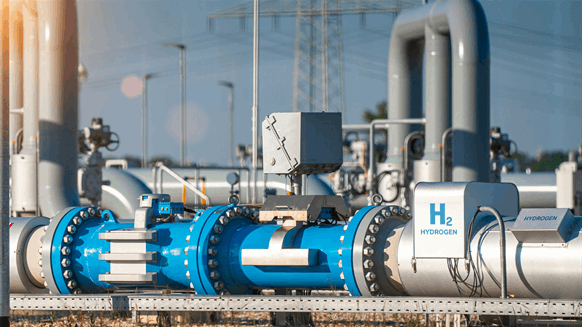The US Department of Energy (DOE) has announced $47.7 million in potential grants for research and development projects on technologies that will enable the commercial-scale deployment of clean hydrogen.
The 16 projects selected as potential recipients “aim to reduce technology costs, improve hydrogen infrastructure, and improve the performance of hydrogen fuel cells, supporting DOE’s efforts to reduce costs and enable deployment commercial-scale clean hydrogen, which is a versatile energy resource that can be produced with zero or near-zero emissions,” the department said in a recent press release.
DOE has set a goal of reducing the cost of low-carbon hydrogen production to $2 per kilogram by 2026 and to $1 per kilogram by 2031, as explained in its annual merit review and the 2022 peer review report.
The bulk of the grants have gone to $17.7 million in liquid hydrogen power projects or components and transfer systems. GTI Energy has been shortlisted with $6 million for its work on a mobile subcooled liquid hydrogen station. Colorado School of Mines could receive $6 million for its work on recovering solid-state hydrogen losses during liquid hydrogen transfer. The third potential grantee for this issue, Linde Engineering North America, has been tentatively awarded $5.7 million for its work on a high-rate liquid hydrogen fuel for HD rails.
Projects exploring on-board liquid hydrogen storage systems have been allocated a total of $11.7 million. Komatsu America has been named for $5 million for its work on a high-capacity on-board storage system for off-highway mining and construction vehicles. Raytheon Technologies could get $3.8 million for its work on a composite tank for storing liquid hydrogen in heavy ground transportation. GE Research has allocated $2.9 million for its work on a composite liquid hydrogen tank for heavy-duty trucks and hydrogen aircraft.
For work on durable, high-performance membrane electrode assemblies for medium- and heavy-duty applications, DOE has allocated a combined $11.3 million. General Motors LLC could employ $4 million for its work on selective transport layers for a polymer electrolyte membrane fuel cell and electrolyzer membrane electrode assemblies (MEA). The University of Hawaii at Manoa has been awarded $4 million for its work on high-performance, durable MEAs with new electrode structures and hydrocarbon proton exchange membranes. Raytheon Technologies could get $3.3 million for its work on a high-throughput hydrocarbon MEA.
DOE has budgeted $6.9 million in total for hydrogen carrier development. Johns Hopkins University is working on efficient ammonia decomposition using high-entropy alloy catalysts without platinum group metals, a project for which it could receive $1 million in grants. Louisiana State University could also get $1 million to enable formate-based hydrogen storage and generation using multimetallic alloy catalysts. Rice University is developing plasmonic photocatalysis for organic liquid hydrogen based on on-demand hydrogen carriers and could get $1 million in funding. The University of Southern California is working on chemical hydrogen storage media with value-added coproducts and has been awarded $1 million. The University of Tennessee at Knoxville, which has been awarded $1 million, is developing highly active hexagonal boron nitride catalysts for the dehydrogenation of liquid organic hydrogen carriers. Washington State University is developing a new liquid organic hydrogen transport technology for hydrogen storage and could receive $1 million. Colorado School of Mines is working on scalable, low-cost hydrogen supply systems, a project for which it has been selected for a second amount, in addition to its selection for its work on liquid hydrogen power , at $900,000.
“Clean hydrogen is critical to reducing emissions in some of the most difficult sectors of the US economy to decarbonize,” the DOE said in the announcement. “These sectors include key economic drivers that are essential to our economy and quality of life, such as heavy transport and industrial and chemical processes such as steelmaking and fertilizer production.”
“While hydrogen technologies have come a long way in recent years, cost and other challenges to scale adoption must be addressed for clean hydrogen to achieve its full potential,” the DOE added .
The DOE and potential recipients will now proceed to negotiations before final awards can be made, the department said.
To contact the author, please email jov.onsat@rigzone.com


